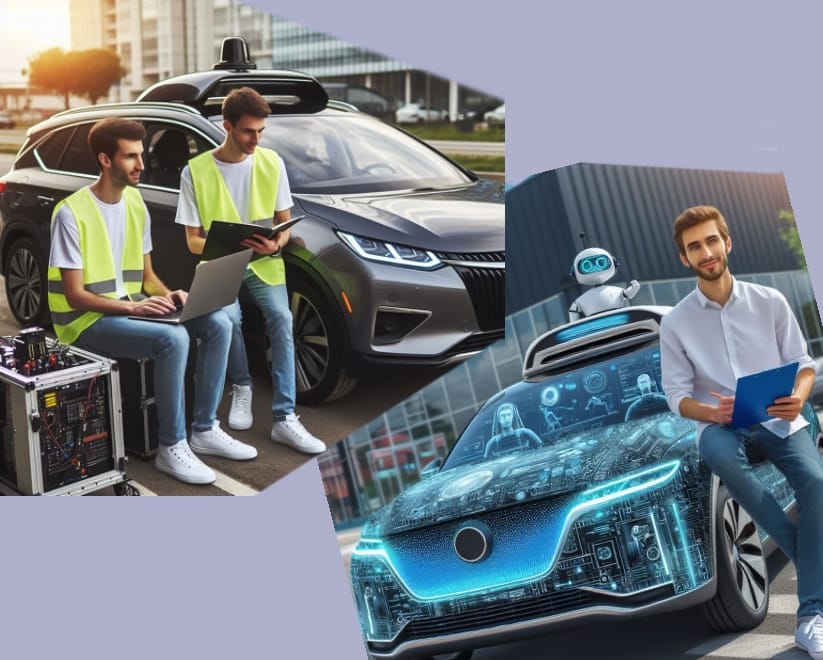Learn from the CTO and Co-Founder the secrets of landing a job at Zoox

Recently, I watched a LinkedIn Live Event featuring Zoox's Co-Founder and CTO, Jesse Levinson, answering questions about 'How to Land a Job at Zoox (Amazon's Self-Driving Car Venture)"
I found it very informative and full of practical tips for those of you thinking about transitioning to robotics engineering.
I reacted to this video, which you can watch here.
However, here is a summary of the questions and answers in the original video that were related to Robotics Engineering. If you'd like to learn about my take for each question, please watch my reaction video above.
Q1: What does a typical interview process at Zoox look like?
Joseph: Recruiter + 1-2 phone interviews + onsite interview + leadership interview
Q2: What Advise do you have for a candidate to stand out?
Jesse: Be inquisitive, do research about the company, think about ways you can help the company achieve its goals and share creative ideas if you have any.
Q3: Is Zoox only hiring experts in the autonomous vehicle industry?
Joseph: "We are not. Some roles require domain knowledge, but it’s not that valuable for many roles. On the whole, we value critical thinking."
Jesse: "If unsure, apply. We seek diverse candidates with transferable experience. Most hires haven't specifically worked on autonomous vehicles before."
Q4: As a PM coming from the finance sector, are there any courses on AV to help me stand out?
Jesse: "Udacity has two courses and Coursera has one. I definitely think it’s a great idea to learn as much as you can, but having a certificate doesn't automatically mean you’re super qualified."
Here are the courses/programs He is referring to:
Udacity Nano-degree Programs
1-Beginner: Intro to Self-driving Cars:
2- Advanced: Self-Driving Car Engineer
Coursera Mini Master Program:
3- Self-driving Car Engineer Specialization
I did a Comprehensive Reviewed the Udacity Nano-degree Program that you can watch here:
Q5: What core skills are you looking for when you hire machine learning engineers?
Jesse: We want people who Understand how machine learning algorithms work and can tweak them if needed. We are looking for people who have 2–3-layer deeper understanding. Understanding the math behind algorithms is key. You need to understand the limitations of an algorithm and know how to improve it. Given that we are trying to innovate at the core algorithm level, that is important to us.”
Q6: If someone does not have a machine learning background, can they pick it up at Zoox?
Jesse: "Yes and No. We typically do not hire someone for an ML role without much ML experience. However, we have an internal mobility program that helps individuals without an ML background but with a strong interest in ML to gain experience and transition to an ML role. For example, one of our top engineers in prediction initially joined us as a software infrastructure engineer with limited ML experience. Now, after 7 years at Zoox, he's one of our best AI/ML engineers, having developed his skills extensively during his time here."
Q7: The role of on-the-job training?
Joseph: "On-the-job learning is undervalued. People often think they need to get a degree to do the job. Some of our best engineers have transitioned into these roles from other fields and they have learned on the job over the course of several years with us."
Q8: What are most common programming languages to learn to be a good fit at Zoox?
Jesse’s answer: C++ and Python. C++ for mostly things that run on vehicle and python for mostly things that don’t. Actually, the most important thing that you do not need to learn a particular language, when we interview candidates, there is a little bit of language specific syntax, but it’s mostly how you think, can you write an algorithm to solve this problem in your faviorite programming language, or let’s think about system design or architecture.
My Take: "C++ and Python are the most prevalent programming languages in the robotics industry, watch this video to learn more:
Landing a job at Zoox with Co-Founder and CTO, Jesse Levinson
Member discussion